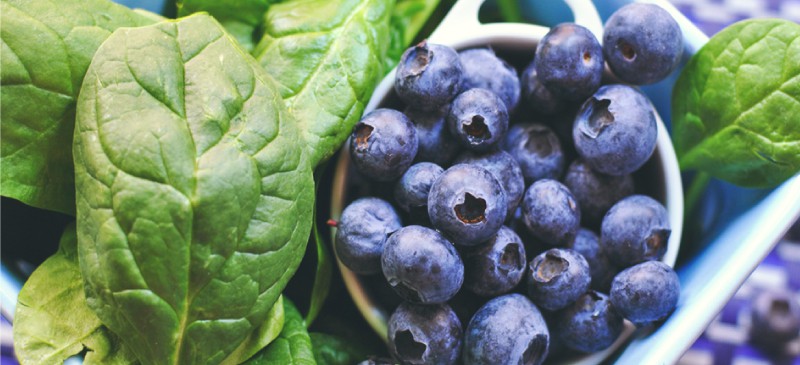Have you ever wondered what makes a “superfood” super? Or what top superfoods like red wine, green tea, kale and blueberries all have in common? The answer is quercetin, a natural compound tied to what all of us seek: better longevity, heart health, endurance, immunity, and more.
Quercetin is considered to be the most widely distributed and extensively studied flavonoid, according to a 2018 review. In fact, it’s been shown in dozens of studies to have anti-carcinogenic, anti-inflammatory and antiviral activities. When combined with the health benefits of bromelain, an anti-inflammatory enzyme, its benefits expand even furhter.
All this explains why many experts recommend consuming food sources that contain quercetin regularly. So what are those foods, and how much should you consume? Let’s explore.
What Is Quercetin?
Quercetin is a type of flavonoid antioxidant that’s found in plant foods, including leafy greens, tomatoes, berries and broccoli. It’s technically considered a “plant pigment,” which is exactly why it’s found in deeply colored, nutrient-packed fruits and vegetables.
Considered one of the most abundant antioxidants in the human diet, quercetin plays an important part in fighting free radical damage, the effects of aging and inflammation, according to many studies.
Ad

While you can get plenty of it from eating a healthy diet, some people also take this compound in concentrated supplement form for even stronger anti-inflammatory effects.
What is quercetin used for? According to the Department of Pathology and Diagnostics at the University of Verona in Italy, quercetin glycosides and other flavonoids, (like kaempferol and myricetin) are “anti-viral, anti-microbial, anti-inflammatory and anti-allergic agents.”
They have potential to be expressed positively in different cell types in both animals and humans.
Flavonoid polyphenols are most beneficial for down-regulating or suppressing inflammatory pathways and functions. Quercetin is considered the most diffused and known nature-derived flavonol there is, showing strong effects on immunity and inflammation caused by leukocytes and other intracellular signals.
What Quercetin Does For the Body
Research shows that anti-inflammatory foods containing quercetin can help manage a number of inflammatory health problems, including heart disease and blood vessel problems, allergies, infections, chronic fatigue, and symptoms related to autoimmune disorders like arthritis.
How exactly do flavonoids benefit us? It all comes down to the abilities of high-antioxidant foods to “scavenge free radicals.”
As a major bioflavonoid in our diets, quercetin (a type of “polyphenolic antioxidant”) helps slow the aging progress because it lessens the effects of oxidative stress on the body. Oxidative stress takes place in all of us but is increased by things like a poor diet, high levels of stress, a lack of sleep and exposure to chemical toxins.
Quercetin plays a role in regulating the immune system’s response to outside stressors through cell signaling pathways called kinases and phosphatases, two types of enzyme and membrane proteins needed for proper cellular function.
Benefits
1. Lowers Inflammation
Flavonoids, (aka bioflavonoids) including quercetin, are important anti-inflammatories because they act as antioxidants, which mean they literally fight the natural process of “oxidation” that takes place over time as we age.
Quercetin can help stop damaging particles in the body known as free radicals, which negatively impact how cells work — including damaging cell membranes, changing the way DNA works, increasing cell mutations and causing healthy cells to die. It can also reduce expression of inflammatory genes such as interleukin.
Research now shows us that inflammation is the root of most diseases, including heart disease, cancer, cognitive decline, some mental disorders and autoimmune disorders.
At this time, practitioners and patients report using quercetin to effectively fight conditions related to inflammation, including:
- “hardening of the arteries” (atherosclerosis)
- high cholesterol
- heart disease and circulation problems
- insulin resistance and diabetes
- eye-related disorders, including cataracts
- allergies, asthma and hay fever
- stomach ulcers
- cognitive impairment
- gout
- viral infections
- inflammation of the prostate, bladder and ovaries
- chronic fatigue syndrome
- cancer
- chronic infections of the prostate
- skin disorders, including dermatitis and hives
2. Fights Allergies
Is quercetin an antihistamine? Some consider it to be a natural antihistamine and an anti-inflammatory, possibly making it effective for lowering the effects of seasonal and food allergies, plus asthma and skin reactions.
However, most research to date has been conducted on animals and not humans.
Histamines are chemicals that are released when the immune system detects an allergy or sensitivity, and they are what account for uncomfortable symptoms we face whenever the body has an allergic reaction.
Ad

Quercetin can help stabilize the release of histamines from certain immune cells, which results in decreased symptoms like coughs, watery eyes, runny noses, hives, swollen lips or tongue, and indigestion.
It’s long been used in ancient Chinese herbal formulas created to block allergies to certain foods (such as peanuts). Studies conducted on mice suggest that it may be equivalent at fighting allergies as some prescription medications, all with little to no side effects.
3. Supports Heart Health
Because of its ability to lower inflammation and oxidative stress, quercetin seems to be beneficial for people with heart and blood vessel-related disorders, according to a number of studies.
For example, eating lots of deeply colored fruits and veggies that contain flavonoids is linked to a lower risk of cardiovascular disease, and even death, in older adults, among reduced risk for vascular diseases.
It’s also been connected to reduced risk for type 2 diabetes and obesity, which have many of the same risk factors as heart disease.
Studies done in animal and some human populations show that various types of flavonoids (quercetin, resveratrol and catechins, for example) can help reduce the risk of atherosclerosis, which is a dangerous condition caused by plaque building up within the arteries. Cut-off blood flow in the arteries is one of the primary risk factors for experiencing a heart attack or stroke, which is why cardiac arrest is less likely among people who eat a nutrient-packed diet.
Antioxidants also seem to protect the body from experiencing increases in LDL “bad” cholesterol and can help regulate blood pressure levels. Certain studies show that quercetin prevents damage to LDL cholesterol particles, and it seems that people who eat the most flavonoid-rich foods typically have healthier and lower cholesterol levels, plus fewer incidences of hypertension and high blood pressure.
In fact, if you’ve ever heard that red wine is good for your heart, that’s because it’s a natural source of quercetin. It’s one of the main active ingredients in red wine extract, which is associated with healthier heart function.
4. Helps Fight Pain
Taking quercetin supplements may help lower pain associated with autoimmune conditions such as arthritis, as well as infections, including those of the prostate and respiratory tract.
That’s because studies suggest quercetin reduces inflammatory pain. For example, there’s some evidence from several small studies that people experiencing bladder pains from infections (causing an urgent need to urinate, swelling and burning) have fewer symptoms when taking quercetin supplements.
Flavonoids are also linked to reduced symptoms of prostatitis (inflammation of the prostate) and rheumatoid arthritis (RA). There’s evidence that when patients with RA switch from eating a “typical Western diet” to one higher in antioxidant-rich foods (like uncooked berries, fruits, vegetables, nuts, roots, seeds and sprouts), they experience less pain and reoccurring symptoms.
READ RELATED: Nitric Oxide Benefits & How to Increase Levels Naturally
5. Might Help Improve Energy and Endurance
Quercetin is added to some athletic supplements because it’s believed to help increase athletic performance and endurance, likely because of its positive effects on blood flow.
Researchers from the School of Applied Physiology at the Georgia Institute of Technology found that, on average, “quercetin provides a statistically significant benefit in human endurance exercise capacity (VO2 max) and endurance exercise performance).”
While improvements were at times small, it makes sense that antioxidants could boost physical performance since they help increase the health of blood vessels, which carry oxygen and nutrients to muscle and joint tissue.
Other studies also show that it helps increase immune function and prevents susceptibility to illnesses that can occur when someone trains intensely and experiences exhaustion. One study found evidence that taking 500 milligrams of quercetin twice daily helped protect cyclists from developing exercise-induced respiratory infections following periods of heavy exercise.
Because it can boost your energy level, does quercetin affect sleep? For example, is there a link between quercetin and insomnia?
One study found evidence that it may alter the sleep-wake cycle partly through activation of GABA receptors. However, insomnia is generally not believed to be a common side effect of taking it in dietary supplement form.
6. Might Help Fight Cancer
A Boston University School of Medicine study published in the Journal of Biological Regulators and Homeostatic Agents shows a link between a nutrient-dense diet rich in quercetin plus other antioxidants and a lowered risk of cancer.
Quercetin seems to have potential chemo-preventive activity and might have a unique antiproliferative effect on cancerous cells, making it an effective addition to any natural cancer treatment approach. Research shows that this may result from the modulation of either EGFR or estrogen-receptor pathways.
Other studies have found quercetin can help stop the processes involved in cell proliferation and mutation, the growth of tumors, and symptoms related to typical cancer treatments, such as radiation or chemotherapy.
At this time, the majority of studies done on quercetin’s effects on cellular functioning have involved animals, so more research is still needed to reveal specific effects on human cancer cells. This is especially true when taken in high doses above the amount someone would get from a healthy diet.
7. Helps Protect Skin Health
Capable of blocking “mast cells,” which are immune cells critical in triggering allergic reactions, inflammatory disease and autoimmune disease, research shows that quercetin helps protect skin from the effects of disorders like dermatitis and photosensitivity.
Flavonoids like quercetin block the release of many pro-inflammatory cytokines, such as IL-8 and TNF, which helps stop symptoms related to skin inflammation, even in people who don’t find relief from other conventional treatments or prescriptions.
Studies have found that this compound has antioxidant and anti-inflammatory effects that help fight allergic and inflammatory diseases, as well as some prescriptions, when taken in oral supplement form. For example, some people take quercetin for eczema since it can inhibit the secretion of histamine and pro-inflammatory markers.
8. Protects Liver Health
Research has shown that this antioxidant has protective effects when administered to rats with ethanol-induced acute liver injury. Researchers concluded that “quercetin, by multiple mechanisms interplay, demonstrates hepatoprotective effect on liver-injury induced by alcohol, by increasing ethanol metabolizing enzyme activities, increasing antioxidant system activities against oxidative stress, lowering the expressions of pro-inflammation cytokines.”
A 2017 study found evidence indicating that quercetin attenuates liver inflammation and fibrosis in mice through inhibiting macrophages infiltration. Researchers believe it “holds promise as potential therapeutic agent for human fibrotic liver disease”, a condition triggered by liver injury and inflammation.
9. Protects Against Neurological Disorders
There’s mounting evidence showing that quercetin offers neuroprotective benefits, due to its ability to defend the brain against oxidative stress and inflammation, leading to potentially less risk for cognitive conditions like Alzheimer’s disease and dementia.
A 2018 study concluded that “findings suggest a possible new protective role for dietary flavonoids on Alzheimer’s disease (AD).” The study found that administration of quercetin in early-middle stages of AD pathology ameliorates cognitive dysfunction and boosts protection mainly related to increased Aβ clearance and reduced astrogliosis, which is related to destruction of neurons.
Food Sources
What foods have the most quercetin? All types of tasty red, green and purple-pigmented plants come packed with quercetin — for example, red wine, blueberries, apples, red onion and even green tea are some of the best sources.
Quercetin is actually believed to be the most abundant flavonoid in the human diet. But the amount found in plant foods can vary a lot depending on where they’re grown, how fresh they are, how they’re prepared and so on.
Some of the top sources of quercetin to add to your diet include:
- Apples
- Peppers
- Red wine
- Dark cherries and berries (blueberries, bilberries, blackberries and others)
- Tomatoes
- Cruciferous veggies, including broccoli, cabbage and sprouts
- Leafy green veggies, including spinach, kale
- Citrus fruits
- Cocoa
- Cranberries
- Whole grains, including buckwheat
- Raw asparagus
- Capers
- Raw red onion
- Olive oil
- Black and green tea
- Beans/legumes
- Herbs, including sage, American elder, St. John’s wort and ginkgo biloba
Supplements and Dosage
Some of the most common types of dietary supplements include: quercetin 3, quercetin 3 glucoside, quercetin aglycone, isoquercetin, quercetin 7 rutinoside, and quercetin 3 0 rhamnoside. Some quercetin supplements are also labeled as quercetin dihydrate, which is mostly insoluble in water and may not be absorbed as well as other kinds.
There isn’t a daily recommended amount of quercetin intake, so dosage recommendations can vary depending on your health condition.
Estimates show that most people typically get between five and 40 milligrams of it a day from eating common plant foods; however, if you stick with a nutrient-dense diet overall, you’re likely to take in much more — as much as 500 milligrams daily according to some reports.
- Optimal doses of quercetin have not been established for any specific conditions by the FDA or any other governing health authority at this time, so it’s up to you and your doctor to decide what amount works best for you.
- For people who turn to quercetin supplements, common oral dosages are 500 milligrams taken twice daily, but it’s also definitely possible to experience benefits when taking lower doses.
Quercetin supplements are available in all types of pills or capsules and are commonly used in formulas along with other anti-inflammatory ingredients. For example, quercetin with bromelain (an anti-inflammatory enzyme found in pineapples) may be taken to help manage allergies.
This may be labeled as a “quercetin complex” formula, which is a synergistic formula that is intended to offer additional antioxidant ad/or anti-aging support.
When buying capsules or supplements, make sure to purchase from a reputable brand and read ingredients carefully, since the amount of active ingredient can vary widely depending on the manufacturer (which is one reason it’s hard to recommend a specific dose).
Side Effects, Risks and Interactions
What are side effects of quercetin? Because it’s derived naturally from foods, quercetin seems to be safe for almost everyone and poses little risks.
According to a 2018 report, most studies have found little to no side effects in people eating nutrient-dense diets high in quercetin or taking supplements by mouth short term.
Is quercetin safe to take daily? Amounts up to 500 milligrams taken twice daily for 12 weeks appear to be safe. If you plan to take this supplement for longer, it’s a good idea to speak with your healthcare professional first.
However, of course, in very high doses there are some risks. Side effects can include headaches and tingling of the arms and legs.
Very high doses taken intravenously have also been linked to cases of kidney damage, although this seems very rare. It’s also possible that quercetin supplementation can interact with the effectiveness of antibiotics, chemotherapy and blood-thinner medications, so use caution if you currently take any of these.
For women who are pregnant or breastfeeding, it doesn’t seem to have any negative effects, although there hasn’t been much research done in this population so it’s always a good idea to talk it over with your doctor first.
Final Thoughts
- What is quercetin? It’s a type of flavonoid antioxidant that’s found in plant foods, including leafy greens, tomatoes, berries and broccoli.
- It’s technically considered a “plant pigment,” which is exactly why it’s found in deeply colored, nutrient-packed fruits and veggies.
- Along with other flavonoids it has been shown to have antiviral, antimicrobial, anti-inflammatory and anti-allergic effects. Using quercetin for allergies is one of the most common reasons people take this compound in supplement form.
- Quercetin supplements and foods might help reduce inflammation, fight allergies, support heart health, combat pain, potentially improve endurance, fight cancer, and protect skin and liver health.
- Some of the top quercetin foods include apples, peppers, red wine, dark cherries, tomatoes, cruciferous and leafy green veggies, citrus fruits, whole grains, legumes, herbs, and more.
- Potential quercetin side effects can include headaches and tingling of the arms and legs, although these are rare.
!function(f,b,e,v,n,t,s)
{if(f.fbq)return;n=f.fbq=function(){n.callMethod?
n.callMethod.apply(n,arguments):n.queue.push(arguments)};
if(!f._fbq)f._fbq=n;n.push=n;n.loaded=!0;n.version=’2.0′;
n.queue=[];t=b.createElement(e);t.async=!0;
t.src=v;s=b.getElementsByTagName(e)[0];
s.parentNode.insertBefore(t,s)}(window, document,’script’,
‘
fbq(‘init’, ‘3475171552810057’);
fbq(‘track’, ‘PageView’);






